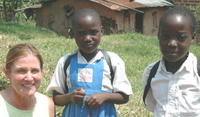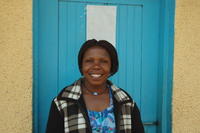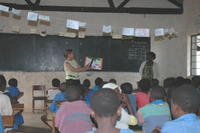Kasiisi School Days: Teaching with Beatrice
Entebbe, Uganda
Sunday, August 14, 2005
Months ago, while taking an Anti-Bias class in Wayland, I met a woman from the Democratic Republic of Congo. When I told her that I would be traveling to Uganda in August, she said, "Oh, you will love the people." Our Bradt travel guide states, "Ugandans as a whole – both those working within the tourist industry and the ordinary man or woman on the street - genuinely do come across as the most warm, friendly and relaxed hosts imaginable." We have found my Congolese classmate and our travel guide to be absolutely accurate. We have loved the people here. The Kasiisi and Kanyawara teachers, in particular, stand out as among the most gracious people we’ve ever met.
The timing of our visit to the schools was not ideal from a Ugandan teacher’s perspective, given the pressure of exams on the near horizon. Even so, we were welcomed with open arms. Throughout our stay, we were delighted and touched by the ongoing openness and generosity of spirit we experienced each and every day. We will never forget the countless acts of kindness and friendship bestowed upon us. We leave our new friends with a heightened awareness that so much more connects us than divides us.
Whether the teacher was a veteran, as Livingston, with 21 years experience, or brand new to the profession, as Agnes, with only 4 months in the field, every teacher made an effort to reach out and connect with us both personally and professionally. We were invited to observe in all classrooms. Teachers were eager to hear our feedback, and were pleased by our responses. They wanted to hear all about our American ways.
 So often, we observed teachers willing to go above and beyond what was expected, for the benefit of their students, and for our benefit as well. One P-5 teacher, Moses, arranged visits to the homes of two students and their families, and then accompanied us to both. He acted as facilitator, guide, translator, friend. We met Lillian (rightmost in the photo, with her sister Joan) in her home at the crack of dawn before it was fully light. Late in the day, we traveled to Dominic’s home and met his father. These visits extended Moses’s school day in ways we can’t even know.
So often, we observed teachers willing to go above and beyond what was expected, for the benefit of their students, and for our benefit as well. One P-5 teacher, Moses, arranged visits to the homes of two students and their families, and then accompanied us to both. He acted as facilitator, guide, translator, friend. We met Lillian (rightmost in the photo, with her sister Joan) in her home at the crack of dawn before it was fully light. Late in the day, we traveled to Dominic’s home and met his father. These visits extended Moses’s school day in ways we can’t even know. We observed incredible energy, commitment, spirit, and good humor among these teachers. We also saw a willingness to take risks. One of the books we took along to Kasiisi was Chicka Chicka Boom Boom. This story, told in rollicking rhyme, is a Kindergarten/Grade 1 classic about the letters of the alphabet climbing up a coconut tree. I asked Beatrice (photo), a fabulous P-1 (Kindergarten) teacher how she felt about risking a little chaos in her classroom of 99 very young students. Classes are very orderly here! Beatrice was game, so we jumped in. I began by asking the children if they could recite their ABCs. They responded by singing their version of the alphabet song. When I asked for a second round, and they sang it again with gusto!
We observed incredible energy, commitment, spirit, and good humor among these teachers. We also saw a willingness to take risks. One of the books we took along to Kasiisi was Chicka Chicka Boom Boom. This story, told in rollicking rhyme, is a Kindergarten/Grade 1 classic about the letters of the alphabet climbing up a coconut tree. I asked Beatrice (photo), a fabulous P-1 (Kindergarten) teacher how she felt about risking a little chaos in her classroom of 99 very young students. Classes are very orderly here! Beatrice was game, so we jumped in. I began by asking the children if they could recite their ABCs. They responded by singing their version of the alphabet song. When I asked for a second round, and they sang it again with gusto! I read Chicka Chicka Boom Boom aloud (photo), and on the second reading, the class was eager to fill in many of the rhyming words. I was elated with the happiness, responsiveness, and enthusiasm of these eager little ones.
I read Chicka Chicka Boom Boom aloud (photo), and on the second reading, the class was eager to fill in many of the rhyming words. I was elated with the happiness, responsiveness, and enthusiasm of these eager little ones.I taught the children the following chant/response:
I said "Boom Chicka Boom"
(kids repeat)
I said "Boom Chicka BOOM"
(kids repeat)
I said "Boom Chicka, Rocka Chicka, Rocka Chicka BOOM!"
(kids repeat)
The kids loved it, and called right out with rousing 6 and 7 year old voices! We had been able to purchase 7 coconuts in Fort Portal, and after passing them around, and talking about texture and color words, P-5 teacher Andrew was kind enough to crack them open with a panga (machete). We carved out 120 small pieces, and each youngster experienced the brand new taste of coconut. More new words, first in Rutooro, then in English were added to the blackboard…We had made 200 photocopies of a Chicka Chicka response sheet in Fort Portal, and 99 bright eyed P-1's gasped when given their own sheet of paper to write on, and their own colored pencils to draw with.
Here’s one part of the story that will endure in our hearts...After each child had received a piece of coconut, Beatrice disappeared momentarily with 20 or so small remaining pieces. When she returned, we learned that she had shared these bits with Kate, her friend and neighboring P-2 teacher. Those 20 small pieces were shared equally among Kate’s 100 children! Instantly, we went to work cutting 100 more pieces of coconut, and by the end of break time, the task was accomplished. We repeated the Chicka Chicka Boom Boom lesson in P-2 that day, and experienced another round of success with Kate and her delightful children.
Generosity, sharing, patience, and respect are part of the fabric of this culture. We observed these qualities in the children daily as they shared colored pencils, as they waited for materials, as they listened attentively to their teachers and to their classmates. We observed the same qualities in the teachers as they supported our efforts, shared their time, children, and classrooms, and listened with interest as we described the resource books and materials we brought with us to Uganda.
One day during a break, a few teachers and I sat in the shade of one of Kasiisi’s trees and talked about a wish list. Their requests included: safe and secure housing, a simple lunch for students and teachers, an opportunity for them to observe their peers, an opportunity to further their training, an opportunity to visit Uganda's national parks (the parks are included in the curriculum, but few teachers have visited them), access to crayons, drawing paper, and markers, money for additional exercise books (most students have just one for all subjects, making correcting difficult), uniforms for the choir, musical instruments, and finally, tennis shoes to wear when teaching PE. These seem like modest requests, but none are easy or simple to carry out.
When we left Kasiisi and Kanyawara, we were showered with gifts. A paper mache mango. A basket. Carved wooden animals for Field School. A handmade bead bracelet. Woven placemats. A beautiful, locally made school bag. Two avacados. A fresh mango. Freshly cut doodo (pronounced doe-doe). Doodo is a spinach-like vegetable that we came to love. A teacher remembered our fondness for it, and brought some fresh from her garden.
Most importantly, we left Kabarole District with the priceless gift of friendship, and a deep desire to return as soon as we can do so.

0 Comments:
Post a Comment
<< Home